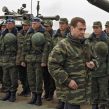
Russian Military Reform And The Unlikely Duet
Publication: Eurasia Daily Monitor Volume: 8 Issue: 41
By:

On February 25, the Kremlin reacted angrily to an article that appeared on the same day in Nezavisimaya Gazeta in which Vladimir Mukhin alleged that responsibility for military reform had passed to the Security Council. Russian presidential press secretary, Natalya Timakova, denied that the defense ministry would be stripped of its role in the reform, with the Security Council tasked to oversee its development and its Deputy Secretary Yury Baluyevskiy handling all issues related to military reform, and characterized Mukhin’s article as a “lie.” Timakova then told journalists: “Two people in our country are responsible for the reform of the armed forces – the supreme commander-in-chief and the defense minister. All the other civil servants and officials can only assist them” (Interfax, February 25).
Mukhin responded later that day by criticizing Timakova during an interview on Ekho Moskvy. Mukhin questioned the presidential spokeswoman’s understanding of Russian law, pointing out the president has special bodies, including the Security Council, involved in the military reform. Mukhin found the assertion that Medvedev and Defense Minister, Anatoliy Serdyukov, were solely responsible as far-fetched. Mukhin concluded, “There is nothing sensational in what was written in the article” since the Security Council’s role in this area is “set out in law,” adding “It is a different matter that this has not been observed in our case” (Ekho Moskvy, February 25).
Mukhin’s article suggested that according to a source in the Kremlin, the carte blanche given to Serdyukov to conduct the reform has been withdrawn. Future reform initiatives would result from decisions at a higher level involving the presidential staff and the Security Council. This was influenced, Mukhin stated, by the numbers of disaffected former officers discharged from the armed forces since 2008, and concern in the ruling duumvirate about the experience of the revolutions in the Middle East as well as recent measures aimed at correcting mistakes made in the reform –especially prioritizing social issues in the context of the forthcoming parliamentary and presidential elections (Nezavisimaya Gazeta, February 25).
The same article also linked these planning issues to Prime Minister, Vladimir Putin, offering sweeteners popular with the military electorate. On February 23, Putin and the Chief of the General Staff, Army-General Nikolai Makarov led a delegation visiting Kaliningrad. The Russian prime minister listened to the views of military veterans and how the problem of low pensions had contributed to their wider dissatisfaction. As Putin “learned” at firsthand about the plight of military pensioners in Kaliningrad, veterans were staging a small-scale protest in Moscow against the reform and demanding Serdyukov’s resignation. Unsurprisingly, Putin said that military pensions will be increased by around 70 percent (Nezavisimaya Gazeta, February 25; Interfax, February 23).
Such initiatives are popular with the wider electorate. In addition to Medvedev’s announcement on February 2 to vastly increase officer salaries by 2012, pension increases and promises to invest 150 billion rubles in building housing for military personnel indicate a pattern of rising defense spending –estimated as representing up to an extra 1.5 percent of GDP. Yet, the offending article in Nezavisimaya Gazeta would hardly have provoked its immediate rebuttal from the Kremlin merely as a result of linking such a state spending spree to electioneering (Echo Moskvy, RIA Novosti, Interfax, February 2; Nezavisimaya Gazeta, February 25).
Offering a knee-jerk response to Mukhin’s article undoubtedly exposed a point of neuralgia for the Kremlin. Timakova’s statement may reflect wider confusion in the Kremlin about the nature of the reform, and could be construed as offering comfort to all those involved in a process which has resulted in inadvertently lowering combat capability and combat readiness: only Medvedev and Serdyukov can apparently claim “responsibility” (Interfax, February 25).
A scarcely believable official line that “all is well” with the reform fails to disguise the reality that for some time it has undergone a series of “corrections.” Reversing the downsizing of the officer corps by promising to add 70,000 to the table of organization and equipment was accompanied by Serdyukov saying that within one month the Security Council would review a defense ministry proposal to increase the number of contract personnel serving in the armed forces. “This issue is still not completely resolved. The Security Council received a directive to review this issue within a month, and the specific figure for increasing the numbers of contract servicemen beginning in 2012 will be determined,” stated Serdyukov (RIA Novosti, February 2). According to defense ministry sources, the Security Council ordered the suspension of plans to reduce by 30 percent command and staff posts in the branches and arms of service and within directorates and departments (Interfax-AVN, February 25).
Of course, none of these developments imply that the Security Council has gained ascendency in the reform. However, the presence in the Security Council of both Baluyevskiy and the former Director of the Federal Security Service (FSB) Nikolai Patrushev, neither of whom are regarded as supporters of the reform, suggests that its radical agenda might be further readjusted.
Medvedev met officers and their families in the Kremlin on February 21, congratulating them on Defenders of the Fatherland Day (February 23). The president promised the continued modernization of the armed forces and invited his guests to air their views on the “progress” of the reform including its disadvantages, before adding a revealing caveat: “Our meeting is not held behind closed doors, we are being recorded by the media, so you should not tell absolutely everything, but please tell us a little about what else should be done.” Consistent with placing its emphasis upon PR, the Kremlin is cautious about the extent to which “disadvantages” may be openly discussed. On February 24, First Deputy Defense Minister, Vladimir Popovkin, addressed the modernization program stressing the ambitious $650 billion rearmament plan will procure 600 new aircraft and 1,000 helicopters for the air force and 100 ships for the navy, including the Mistral (https://eng.kremlin.ru/news/1798, February 21; ITAR-TASS, February 24).
During a late-night meeting with his staff on February 3, Putin lamented that the Russian army is smaller than the interior ministry forces (https://premier.gov.ru/events/news/14024/video.html). Such thinking, manifesting itself in resistance to officer downsizing and dogmatically hooked on the claim to have a “one million” strong military, indicates an enduring belief in quantity rather than quality. Whatever the precise details of modernization include, a hybrid army has formed combining the salvageable elements of the original reform plan with the old army and its manifold problems.




